Research Presentations 2022

Pandemic Effects and Library Directions
virtual
In this session, OCLC Research staff summarised findings from interviews with 29 library leaders from 11 countries conducted during the height of the pandemic, the themes of which were synthesized in the briefing, The New Model Library: Pandemic Effects and Library Directions.
Topics: New Model Library
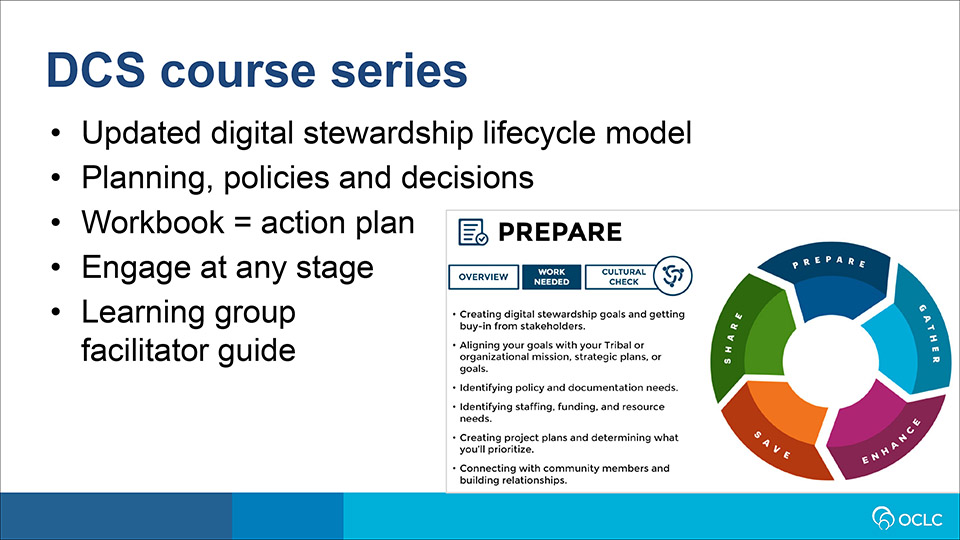
Developing Digital Stewardship Training: Reflections from a Collaborative Project to Strengthen Staff Skills
virtual
Representatives of the Digital Stewardship Training project team will share learnings from the project, courses being created, and the work of the Center for Digital Scholarship and Curation.
Topics: Research Support

Opening Keynote: Workflow is the New Content
virtual
The digital environment makes workflow support more important, as activities, content, and communications are tied together on the network in various combinations. In his opening keynote, Dempsey discusses a variety of issues, in the context of changing research behaviors, metrics, the move to open, and other factors, with a library or research setting in mind.
Topics: Research Support, Research Information Management, Research Data Management

Linked Data as a Cooperative Effort
virtual
This session discusses the initiative, its progress, and what it suggests for the future of metadata work in libraries, along with what this might mean in the context of the new agreement signed between OCLC and Jisc which provides an enhanced ability to share and reuse bibliographic metadata across UK higher education institutions.
Topics: Linked Data, Metadata
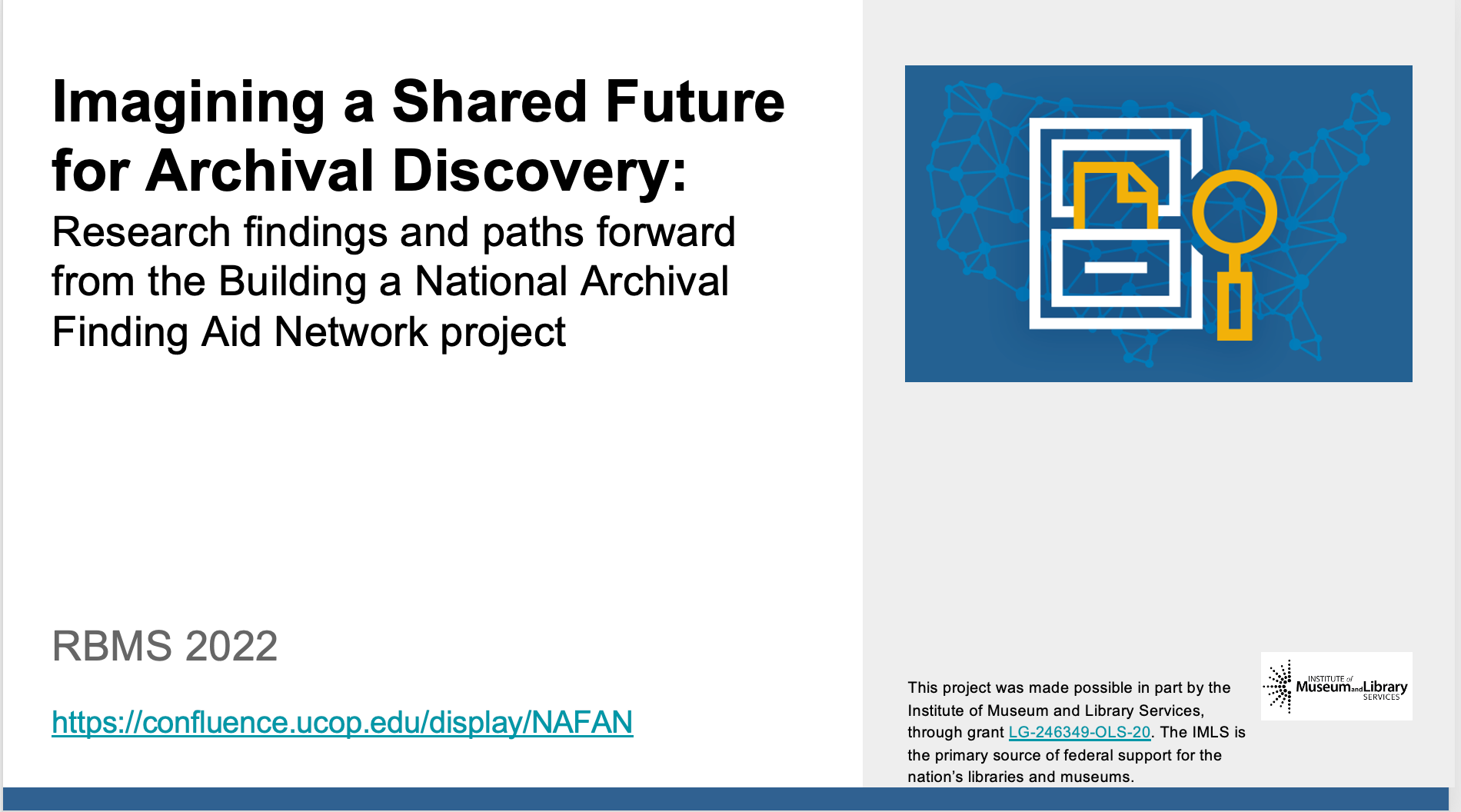
Imagining a Shared Future for Archival Discovery
Building a National Finding Aid Network (NAFAN) is a collaborative project rooted in the goal of providing inclusive, comprehensive, and persistent access to descriptions of archival collections by building the vision and roadmap for a national finding aid network available to a broad and diverse set of contributors and researchers. OCLC Research has conducted extensive research with archivists and archival users, in service of shaping the NAFAN vision. The project team will give an overview of NAFAN, share research findings, and discuss how these will inform the vision for a national archival discovery platform that is community-driven, -sustained, and -governed.
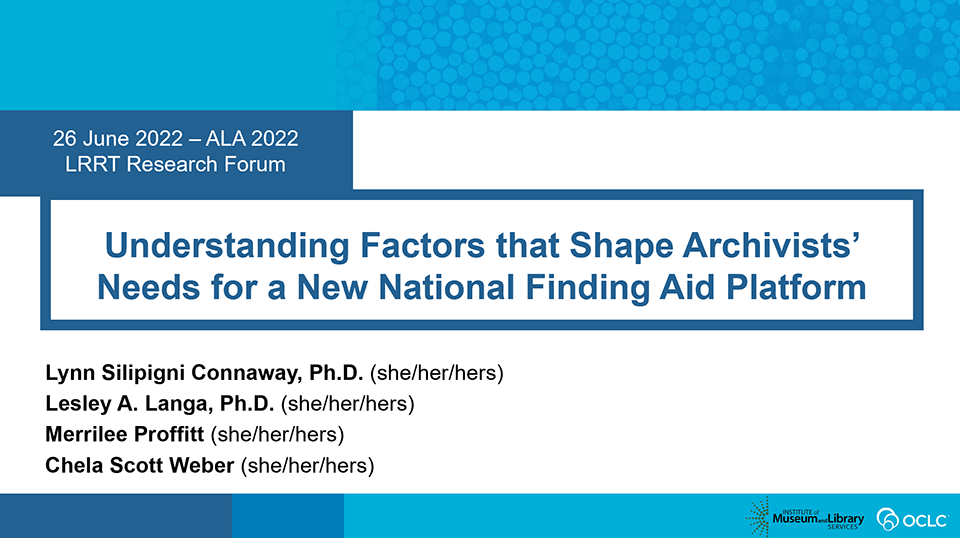
Understanding Factors that Shape Archivists’ Needs for a New National Finding Aid Platform
Washington, DC
The authors identify and discuss the opportunities and challenges archivists experience when describing archival materials, sharing archival description on the web, and making decisions about whether or not to participate in current finding aid aggregations.
Topics: User Research, Archives and Special Collections
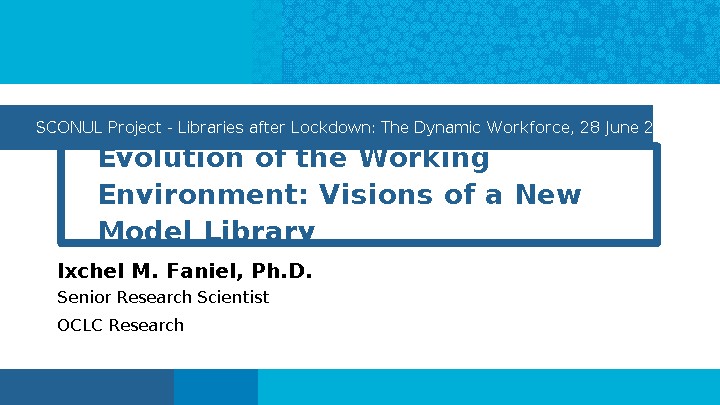
Evolution of the Working Environment: Visions of a New Model Library
Virtual
The pandemic provided an opportunity to reimagine the working environment as we embraced flexible and remote working. How much has the work environment really evolved since the pandemic? And how sustainable is this evolution? What has been the impact on recruitment and retention in this evolving landscape? This session heard from international partners about the realities of changing working environments and practices at their institutions and considered what lessons we can learn from their experiences.
Topics: New Model Library
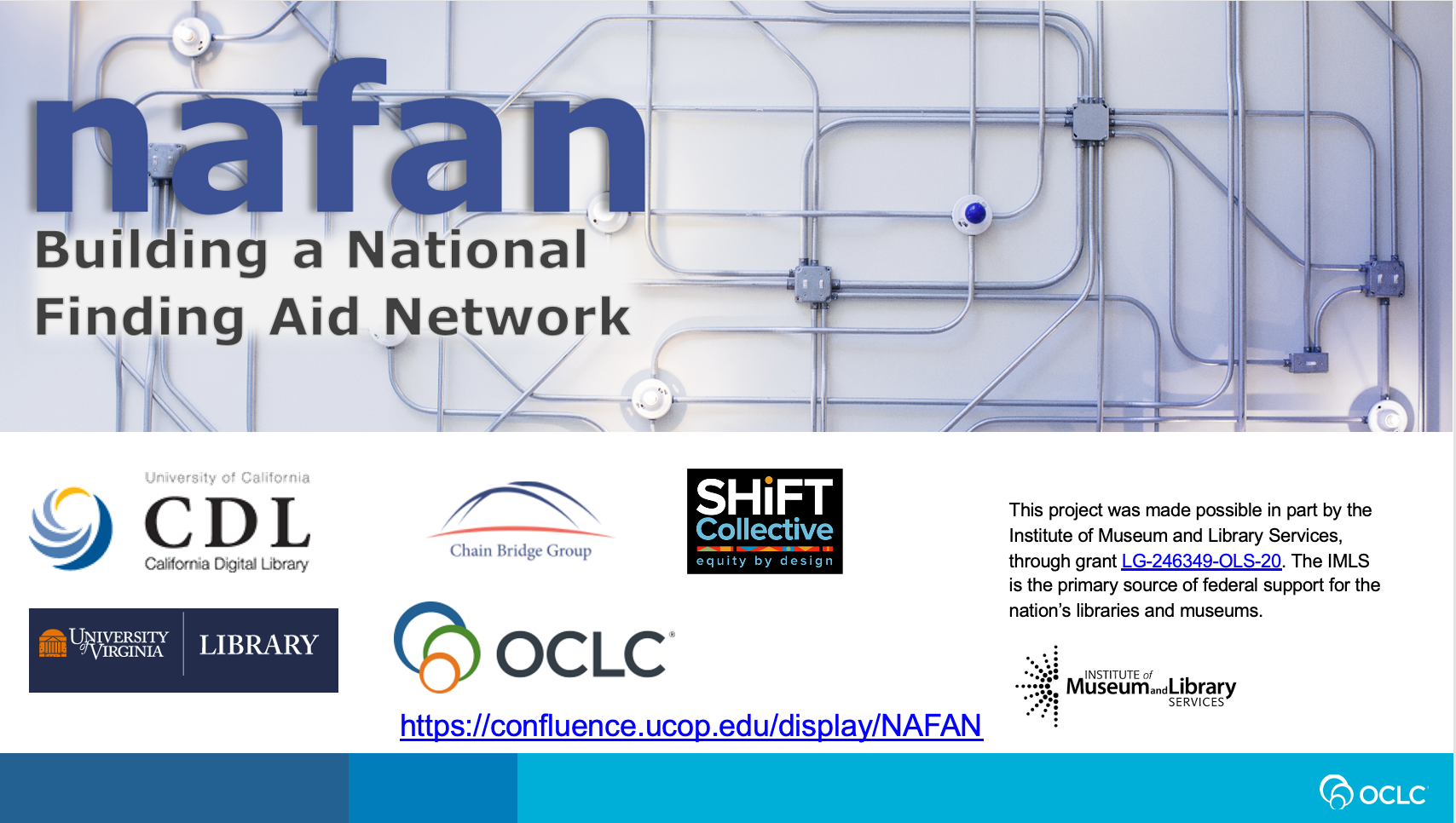
NAFAN Building a National Finding Aid Network Research Update
Virtual
Across three presentations, the NAFAN research team shares an update on their work and preliminary research findings from focus groups interviews with archivists and a pop-up survey of archives users. They also discuss research questions, data collection and analysis methods, and efforts to align methods with project values and principles.
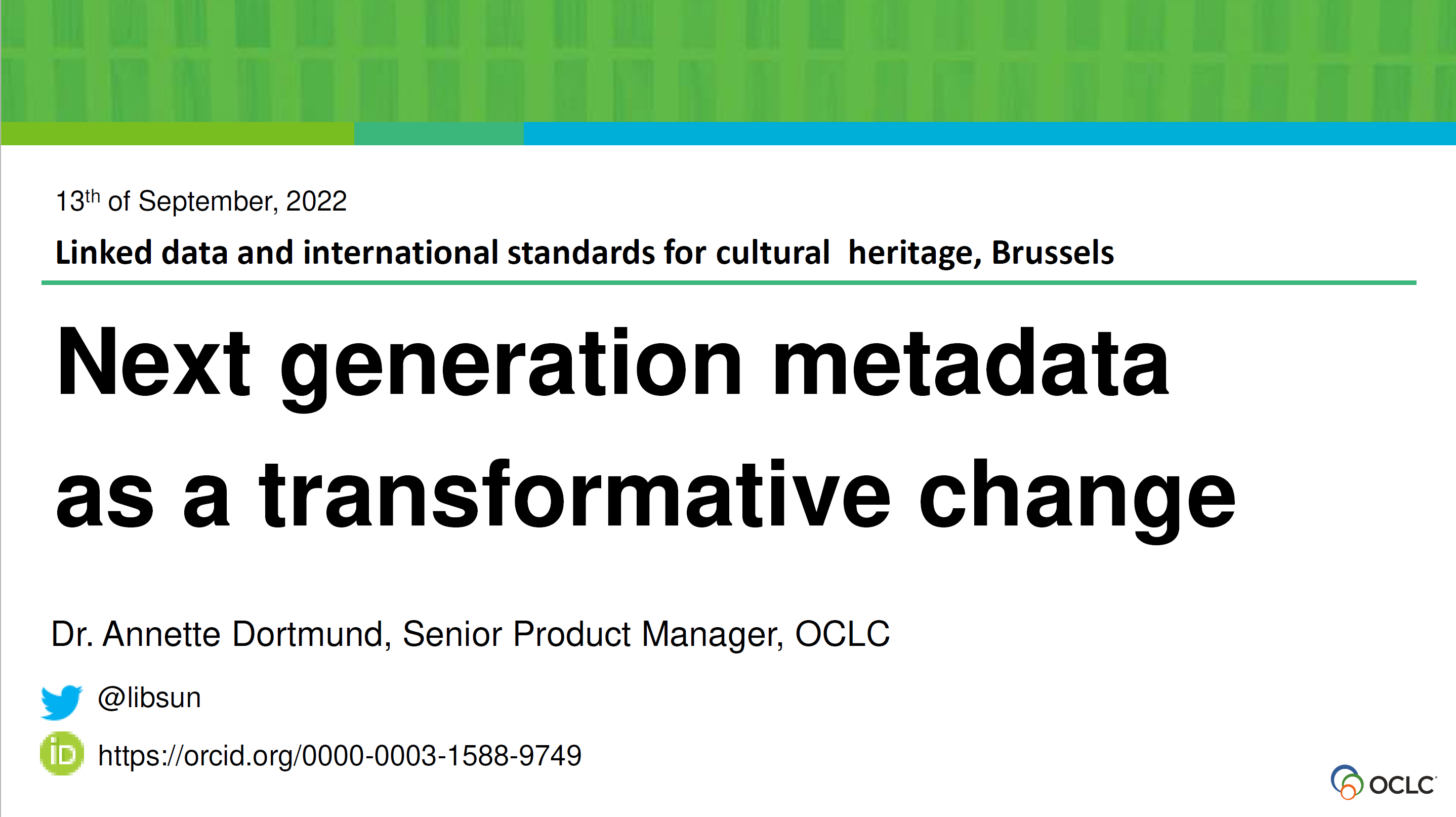
Next Generation Metadata as a Transformative Change
In this session, Dortmund shares lessons learned in OCLC’s work and research to date but will also enumerate a number of remaining challenges that require library engagement to address.
Topics: Linked Data, Metadata
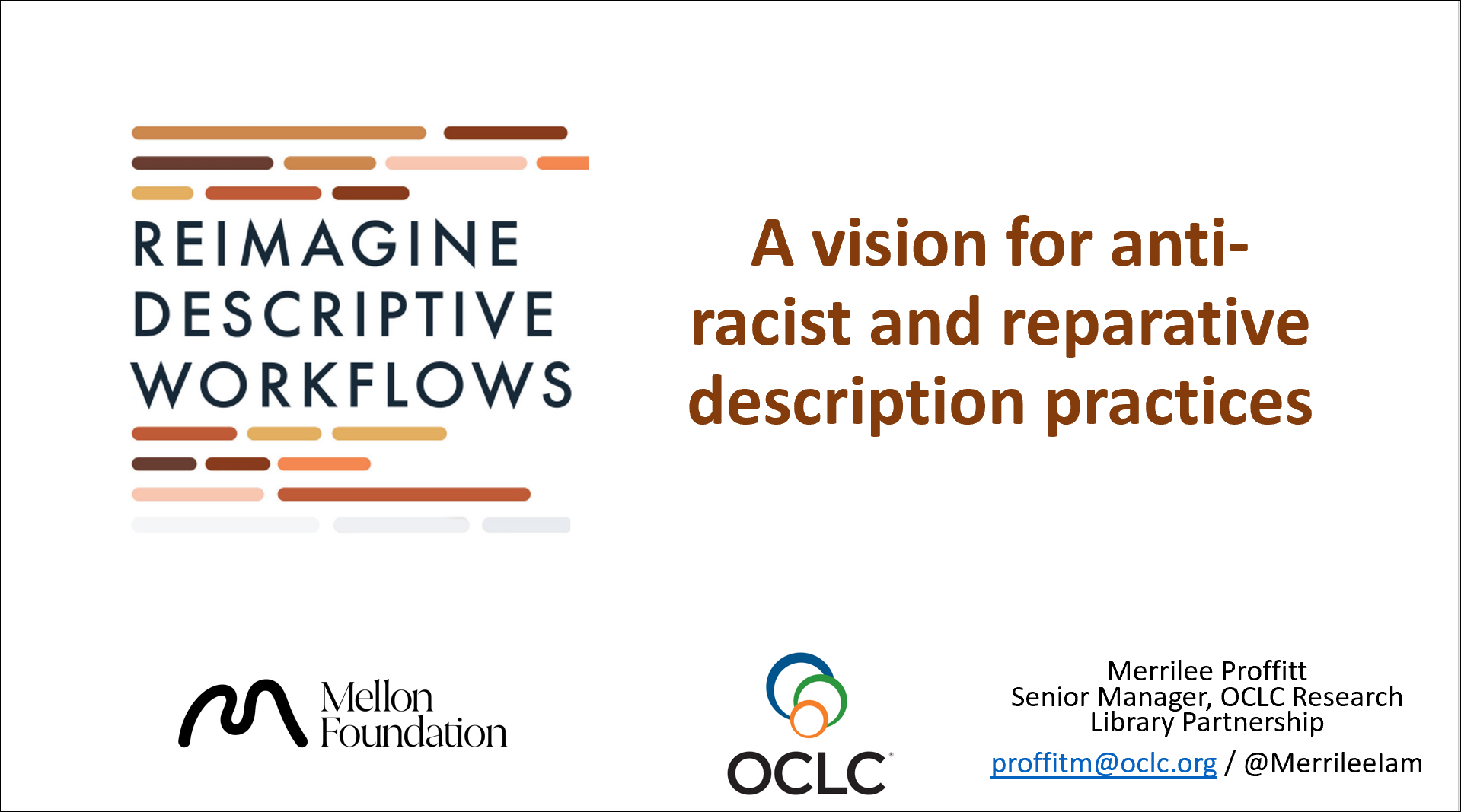
Reimagine Descriptive Workflows: A vision for anti-racist and reparative description practices
virtual
In this presentation, Proffitt explains how the convening was constructed, and how it informed a community agenda created with the goal of moving organizations towards descriptive practices that are inclusive and respectful for all.
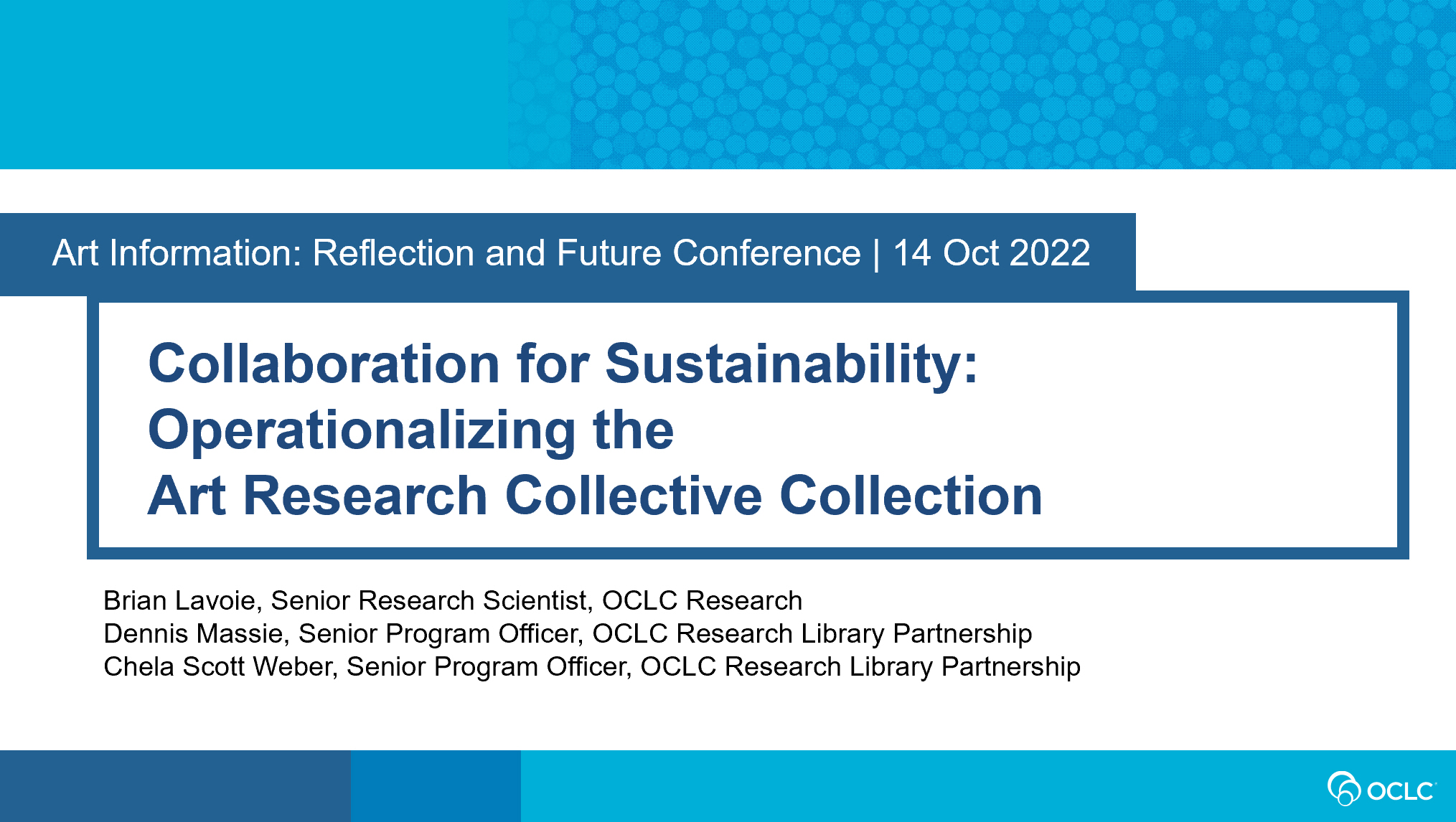
Collaboration for sustainability: Operationalizing the Art Research Collective Collection
virtual
Operationalizing the Art Research Collective Collection (OpArt) is an OCLC Research project exploring opportunities for collaboration between art, academic, and independent research libraries. This presentation reports on the project’s first two phases: an art research collective collection analysis using WorldCat data, and an analysis of interlibrary loan (ILL) sharing patterns using five years of WorldShare Interlibrary Loan data.
Topics: Collective Collections
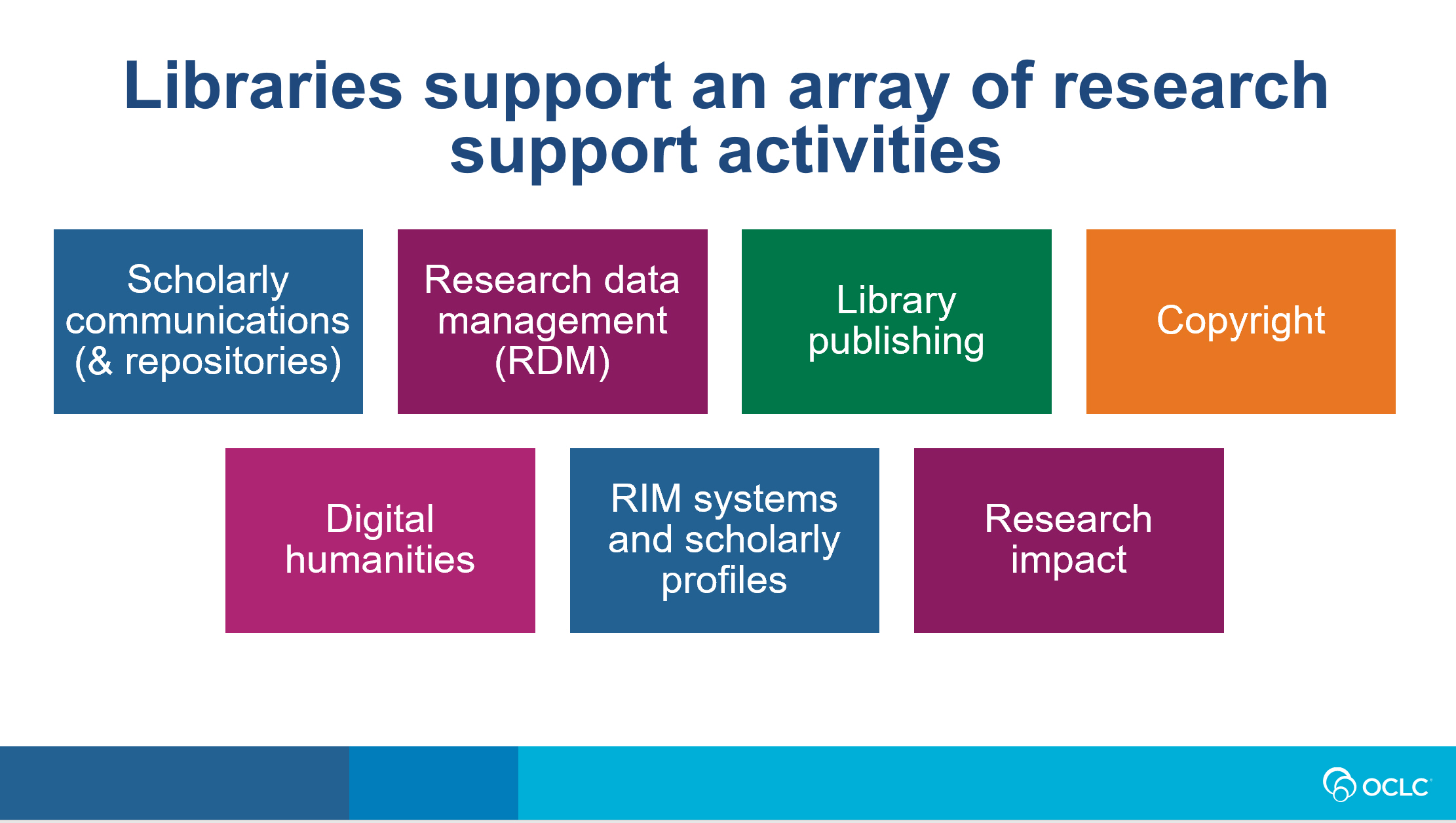
“OH, THE PLACES YOU’LL GO” together: Case studies in cross-institutional collaboration
virtual
This presentation includes a brief introduction to social interoperability followed by two rich case studies of successful cross-campus collaboration by panelists at Syracuse and Waterloo Universities.
Topics: Research Support, Research Information Management, Research Data Management
Research Presentations 2021
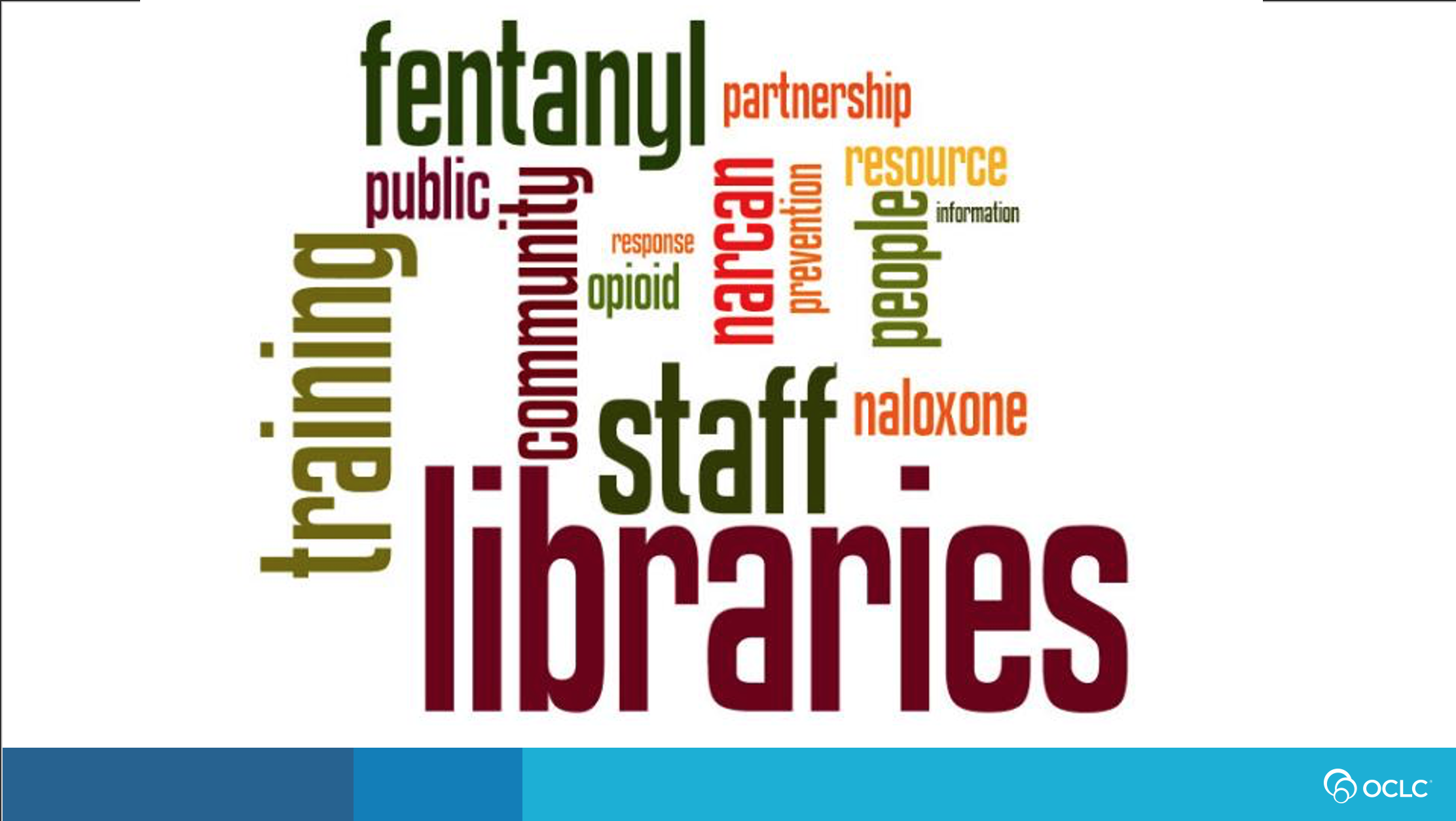
Public Libraries Respond to the Opioid Crisis with Their Community
virtual
Dr. Lynn Silipigni Connaway shares the findings of the project, Public Libraries Respond to the Opioid Crisis with Their Communities, to study how public librarians responded to the opioid crisis within their communities by partnering with other community agencies and services. This presentation was given at the Network of the National Library of Medicine SCR CONNECTions monthly webinar series.
Topics: Opioid Crisis
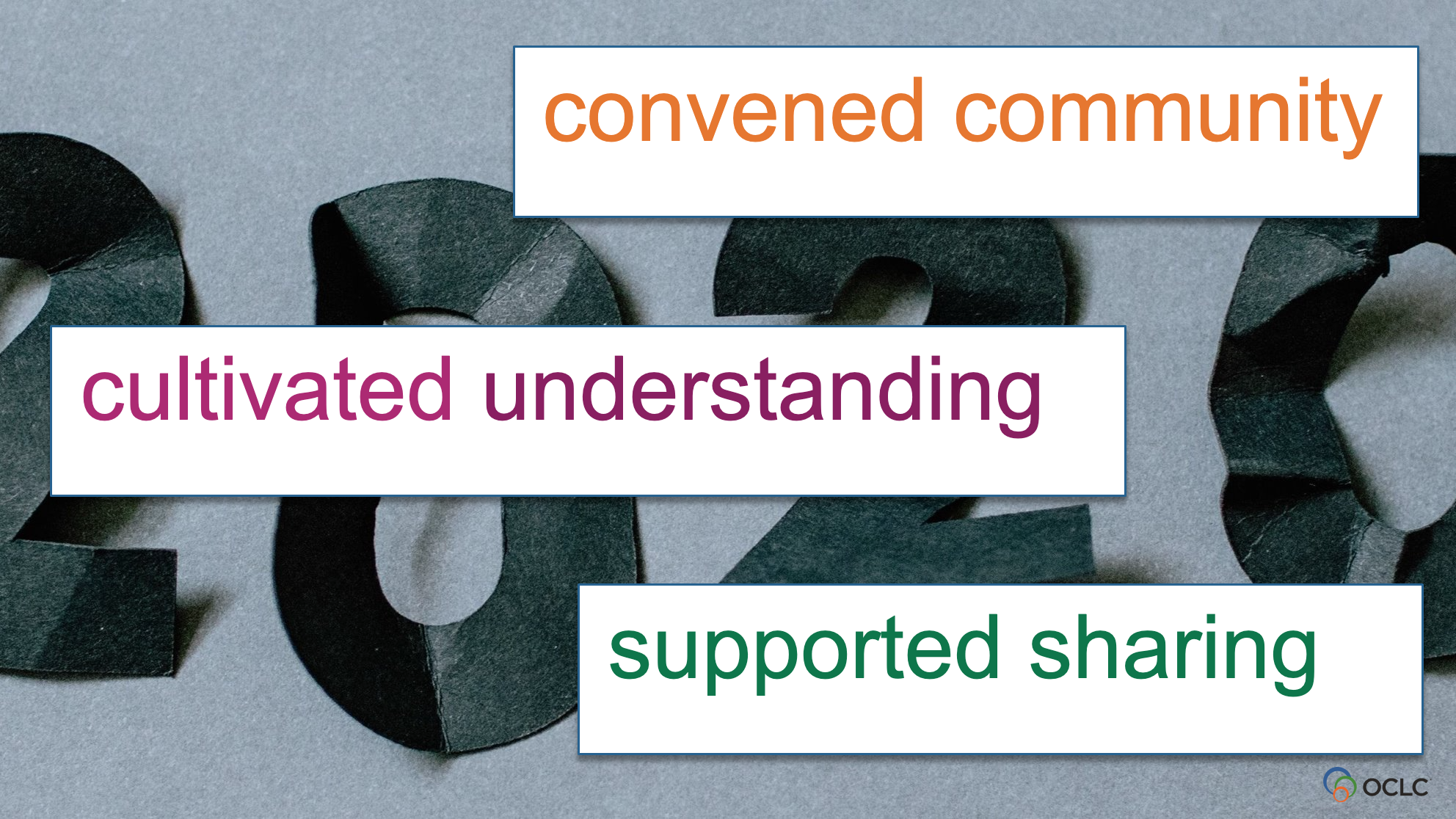
OCLC Research Update: Convening, understanding, and sharing
virtual
Amid the swirl of rapidly changing circumstances that unfolded dramatically during 2020, OCLC Research undertook new projects and transformed existing projects to help library staff and decision makers respond to the broad changes unfolding around them, while also identifying implications for the library mission, and ultimately, library resources and services. From REALM, to adapting resource sharing practices, to innovations in linked data, to describing the New Model Library, to creating pathways to civil legal justice, these projects all involve activities to understand emerging needs and contexts, convene library stakeholders to synthesize diverse perspectives and ideas, and share information and resources broadly with library leaders, staff, and researchers. This January 2021 update session includes presentations on:
- Community Stories: Resource Sharing
- Transition and Transformation: Realigning to develop a New Model Library
- Linked Data Research
- Library Learning during COVID-19
Session presenters:
Rachel Frick, Executive Director, OCLC Research Library Partnership;
Lynn Silipigni Connaway, Director of Library Trends and User Research;
Andrew Pace, Executive Director for Technical Research;
Sharon Streams, Director of WebJunction and OCLC Project Director for REALM.
Topics: Resource Sharing, New Model Library, Linked Data
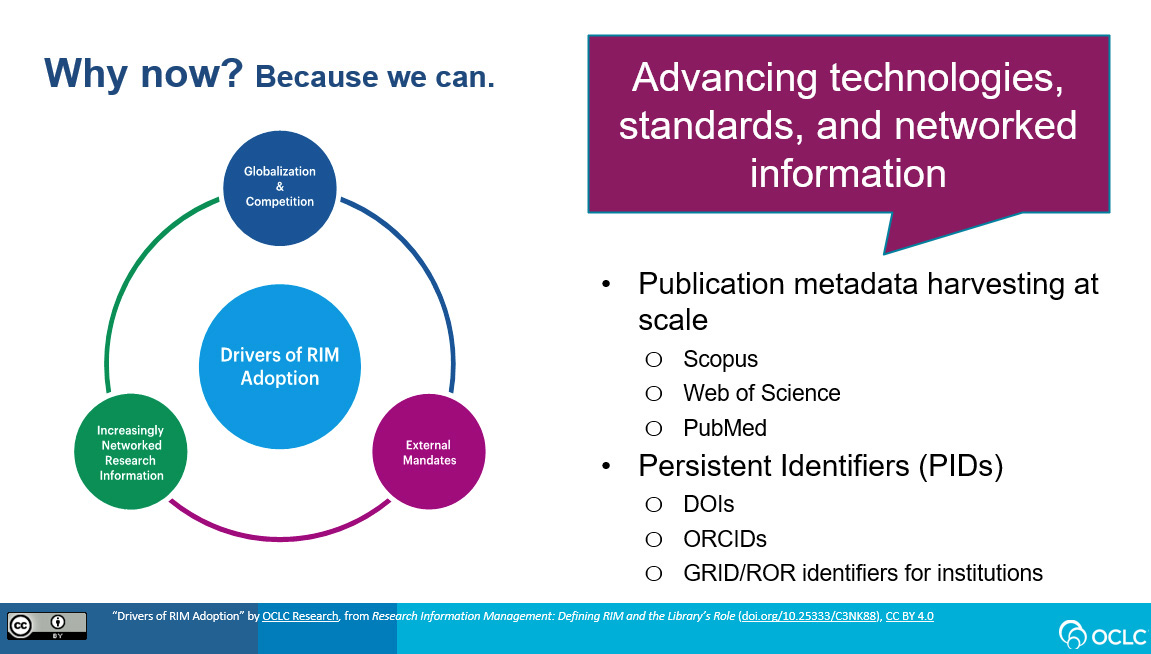
The Rapidly Changing Research Information Management Landscape
virtual
Expert finder systems are part of a larger ecosystem of research information management, comprising a variety of use cases, systems, practices, workflows, and stakeholders. This broad array of activities mirrors the complexity and decentralization so characteristic of U.S. higher education, but still reflects commonality in the core practice of aggregating, curating, and using metadata about institutional research activities. Bryant discusses the rapidly changing RIM landscape in the US, the focus of a current project at OCLC Research.
Topics: Research Information Management
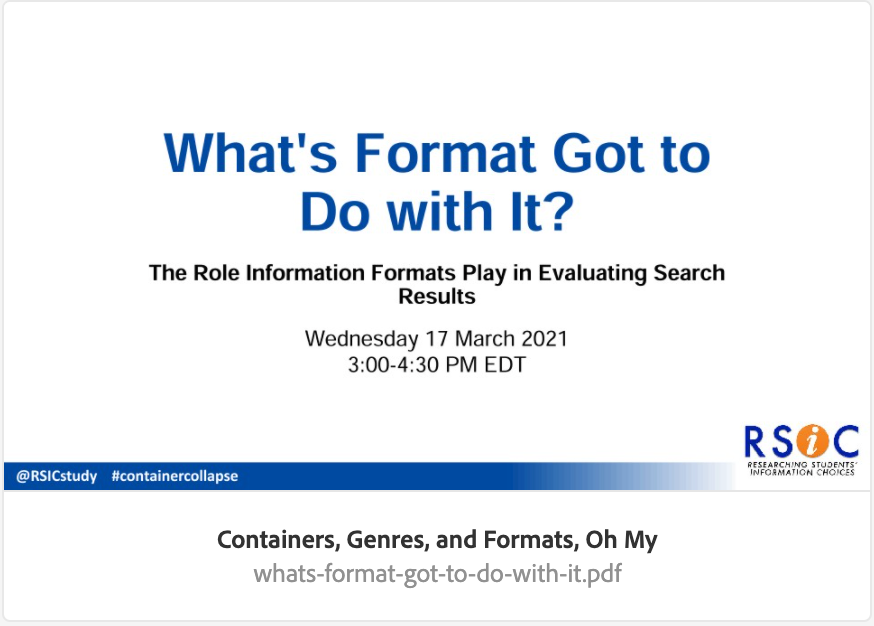
What's Format Got to Do with It? The Role Information Formats Play in Evaluating Search Results.
This webinar presents research on the role information formats play in student evaluation of search results and identifies practical applications for libraries of all types.
Topics: User Research, Student Support, Information Literacy
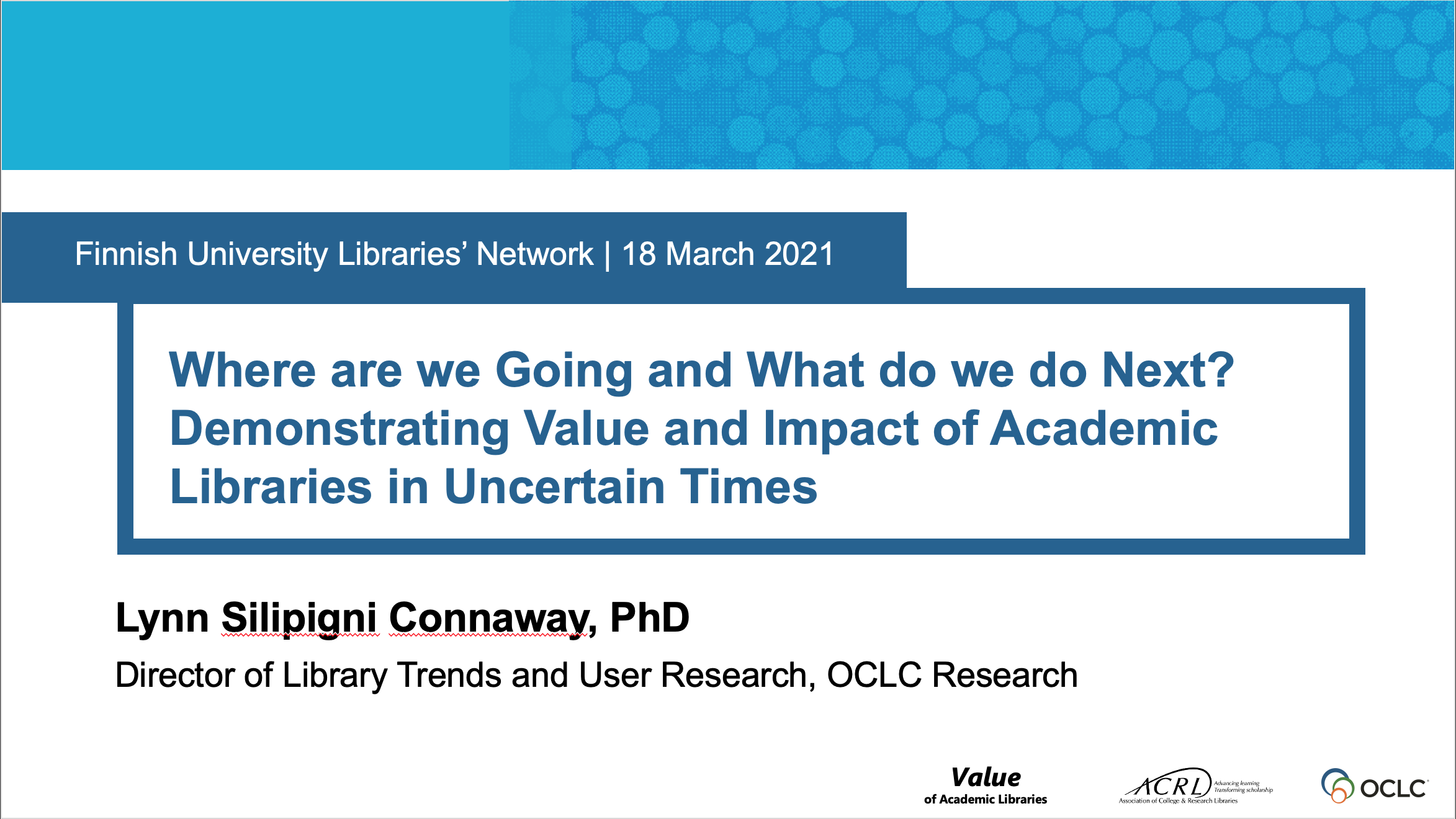
Where are we Going and What do we do Next? Demonstrating Value and Impact of Academic Libraries in Uncertain Times
virtual
Articulating the value of academic libraries is crucial, especially in the current socio-economic environment exacerbated by the effects of the COVID-19 pandemic. The Association of College & Research Libraries, a division of the American Library Association, and OCLC Research collaborated on research to identify ways academic librarians can contribute and demonstrate the library’s value to student learning and success at their institutions. This presentation provides highlights of the research with recommendations for promoting the academic library’s value.

Creating, Curating, and Using Cultural Heritage Metadata and Resources in a Linked Data Environment
Discussion of the CONTENTdm Linked Data Pilot Project, a collaborative investigation exploring the creation, curation, and applied use of digital material linked data. This presentation will include inspiration for the work, a brief technical overview of the project, as well as a sneak peek at one of the pilot project’s most creative deliverables: the CONTENTdm Image Annotator. The presenters will demonstrate this new tool and its ability to enhance and deepen metadata description and its potential to increase the user’s understanding of digitized content. The presentation will conclude with a brief discussion of the pilot project’s impact and its potential to enhance and change CONTENTdm in the near future.
Topics: Linked Data
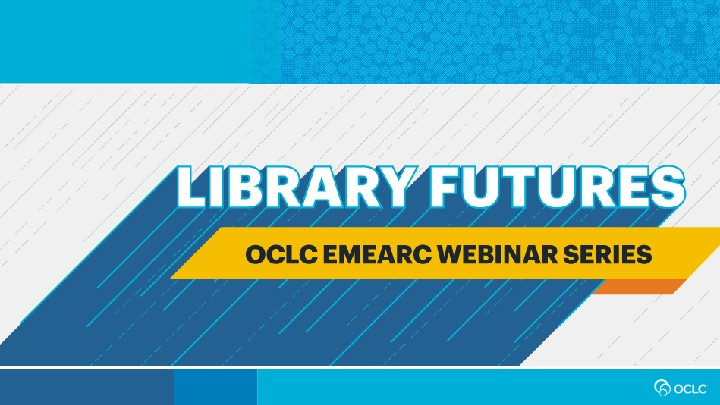
New Model Library
Library leaders had to make immediate changes because of the impact of the COVID-19 pandemic on their workflows and community offerings. Some of these changes will impact the library going forward. The OCLC Research team met with global library leaders to discuss emerging library models. This session reflected on their long-term vision for libraries as a result of changing practices and environments.
The speakers were joined by a group of panelists, who are also EMEA Executive Committee members: Stuart Hunt, University of Reading; Beate Meinck, Reutlingen Public Library; and Evi Tramantza, Anatolia College.
Topics: New Model Library
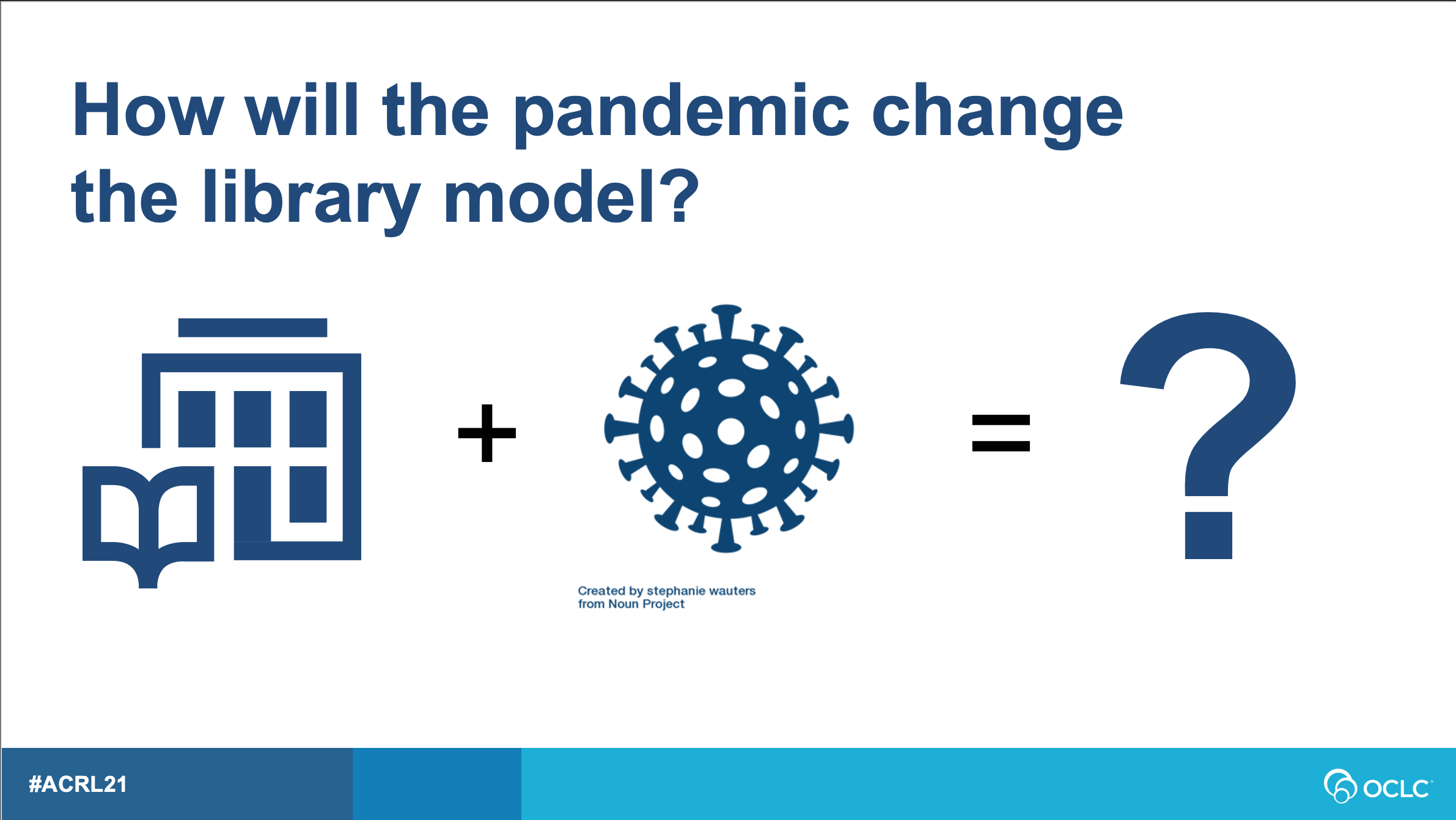
Transition and Transformation: Realigning to develop a New Model Library
virtual
The COVID-19 pandemic has fundamentally changed higher education and academic libraries. Services and modes of collaboration have had to shift dramatically to adapt to challenges and support the rapidly changing needs of our communities. This panel featured three research projects that identify how academic libraries and researchers have responded to the COVID-19 pandemic: how researchers have modified the ways they collaborate, conduct and disseminate research, and how they have used the pandemic to generate new research; how academic library leaders have used these responses to envision a new model library; and how libraries have transitioned to fully virtual reference models.
Topics: New Model Library
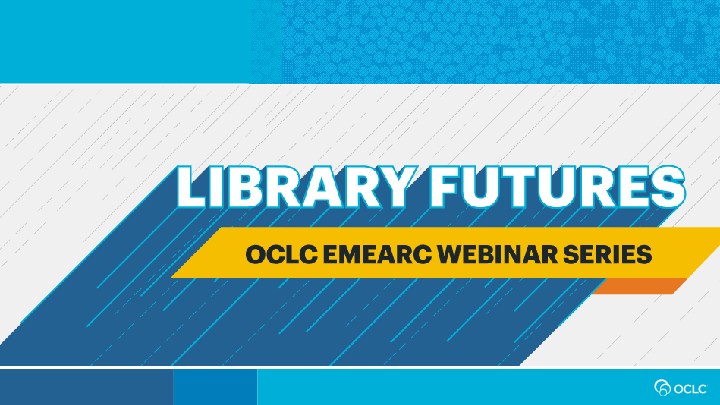
Metadata is changing – outcome from an EMEA wide discussion around the next generation of metadata.
After a series of discussions across EMEA, this winter, on the topic of ‘next generation metadata’ and ‘transforming metadata into linked data to improve digital collection discoverability’, this webinar summed up the main findings and shared experiences, in order for participants to gain confidence in planning ahead.
The speakers were also joined by a panel of OCLC colleagues who reacted to the findings from the round table discussions. They were Andrew K. Pace, Executive Director for Technical Services; Rachel Frick, Executive Director, Research Library Partnership; and John Chapman, Senior Product Manager, Metadata Services.
Topics: Metadata
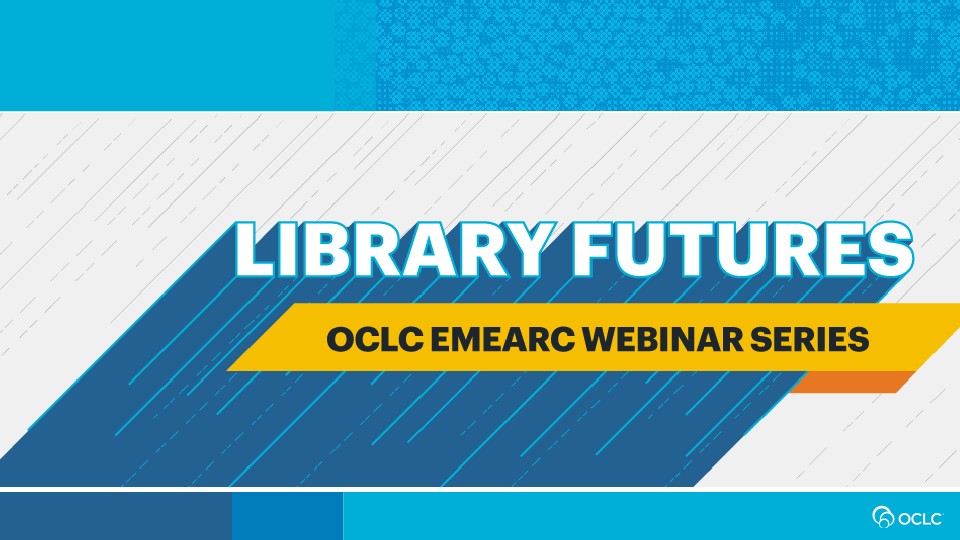
Implementing Sustainable Development Goals in my library
Get inspired to take action in your library and to implement Sustainable Development Goals (SDGs) into your strategic planning. In this session, you heard about the results of a survey on global insights on SDGs, and also how to measure success and impact of their implementation.

Reimagining Description for Libraries, Archives, and Special Collections: an Anti-Racist Approach
virtual
An OCLC presentation by Mary Sauer Games, VP Global Product Management, and Merrilee Proffitt, Senior Manager OCLC Research.
Digital Reference Page available here: oc.lc/acrl-citations
Description, subject analysis, classification, authority control, and cataloging practices are part of a powerful naming and labeling process in bibliographic cataloging. Metadata is laden with outdated, harmful, and even racist terminology. Though many areas of librarianship and archival work have evolved, core ontologies and taxonomies at the heart of descriptive and classification practices remain biased and rooted in white supremacy. This presentation will cover how OCLC has sought to learn and advance knowledge for member libraries though research and programming. Additionally, we will share information about an initiative funded by the Andrew W. Mellon Foundation and OCLC that will produce a consultative community agenda. This agenda will inform research, learning, and other actionable steps that libraries, archives, and allied organizations can take to reimagine descriptive practices in the records they steward, and will establish a foundation for future community engagement and reciprocal consultation.
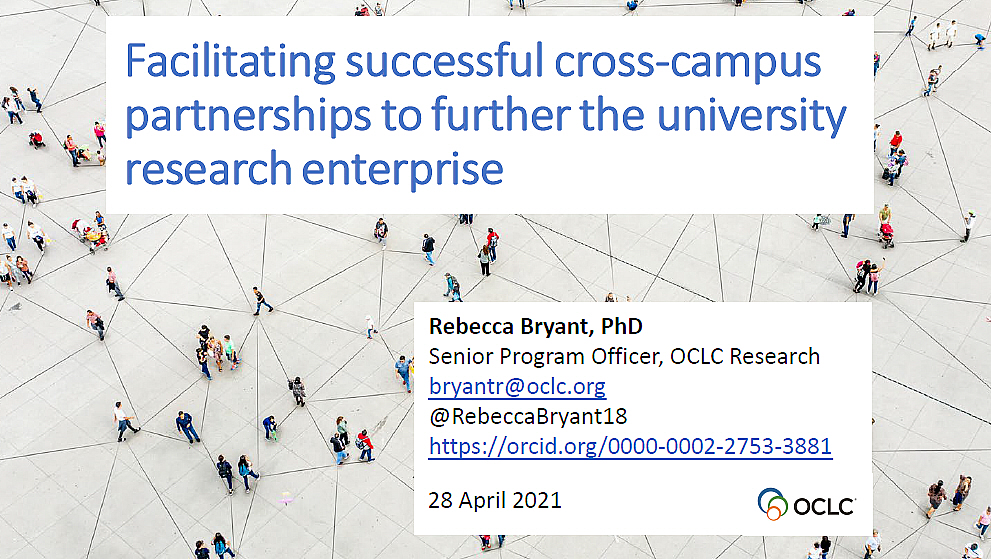
Facilitating Successful Cross-Campus Partnerships to Further the University Research Enterprise
virtual
This presentation provides an introduction to the recent OCLC Research report, Social Interoperability in Research Support: Cross-Campus Partnerships and The University Research Enterprise. Bryant explains why this collaboration is important, who the stakeholders would be, identifies the categories of support-services this collaboration will likely surface, and provides strategies and practical advice about cross-campus relationship-building in research support.
Topics: Research Information Management, Research Support, Research Data Management

Social Interoperability Workshop 1: Understanding Social and Structural Norms That Shape Academic Institutional Collaboration
virtual
Successful advancement of open scholarship initiatives at research universities worldwide is dependent upon collaboration and partnership among many stakeholders from across the institution. The recent OCLC Research Report, Social Interoperability in Research Support: Cross-Campus Partnerships and the University Research Enterprise, emphasizes that the best chance for developing these relationships is to cultivate a deep understanding of potential stakeholders: their responsibilities, pain points, and areas of common interest where engagement can take root and flourish.
However, in the recent OCLC-LIBER Open Science Discussion Series, many librarians reported feeling inadequately equipped to connect with the array of non-library stakeholders essential for open science success, despite the widespread acknowledgement that “open science must be a collective effort.” One participant even stated, “It’s making the connection that is most important…because we don’t know what they need.” A key takeaway from that discussion series was that library practitioners must develop a specific type of soft skill: the ability to create and maintain working relationships between individuals and organizational units that promote collaboration, communication, and mutual understanding. We call this skill “social interoperability.”
In May 2021, OCLC and LIBER are again collaborating to offer a three-session workshop series exclusively for LIBER members and OCLC Research Library Partnership Affiliates, using both the Social Interoperability in Research Support report and the key takeaways from the OCLC-LIBER Open Science Discussion Series, as a core component of the workshop curriculum. This workshop series is a pilot effort and participation numbers are strictly limited. Our organizations will be working together to assess the pilot and explore if this training exercise can be scaled to support more librarians.
WORKSHOP 1
The first workshop explores the social and structural norms that shape academic institutional collaboration, particularly examining the model of universities as “complex, adaptive systems.” It also introduces participants to key institutional stakeholders in research support. Participants engage in small group discussions about the challenges and barriers to collaboration at their institutions and begin work to create a mapping of their institutional structures.
Resources:
- Social Interoperability in Research Support, pages 1-15
- Session 1 Handout: Understanding social and structural norms that shape academic institutional collaboration.
Topics: Research Data Management, Research Support, Research Information Management
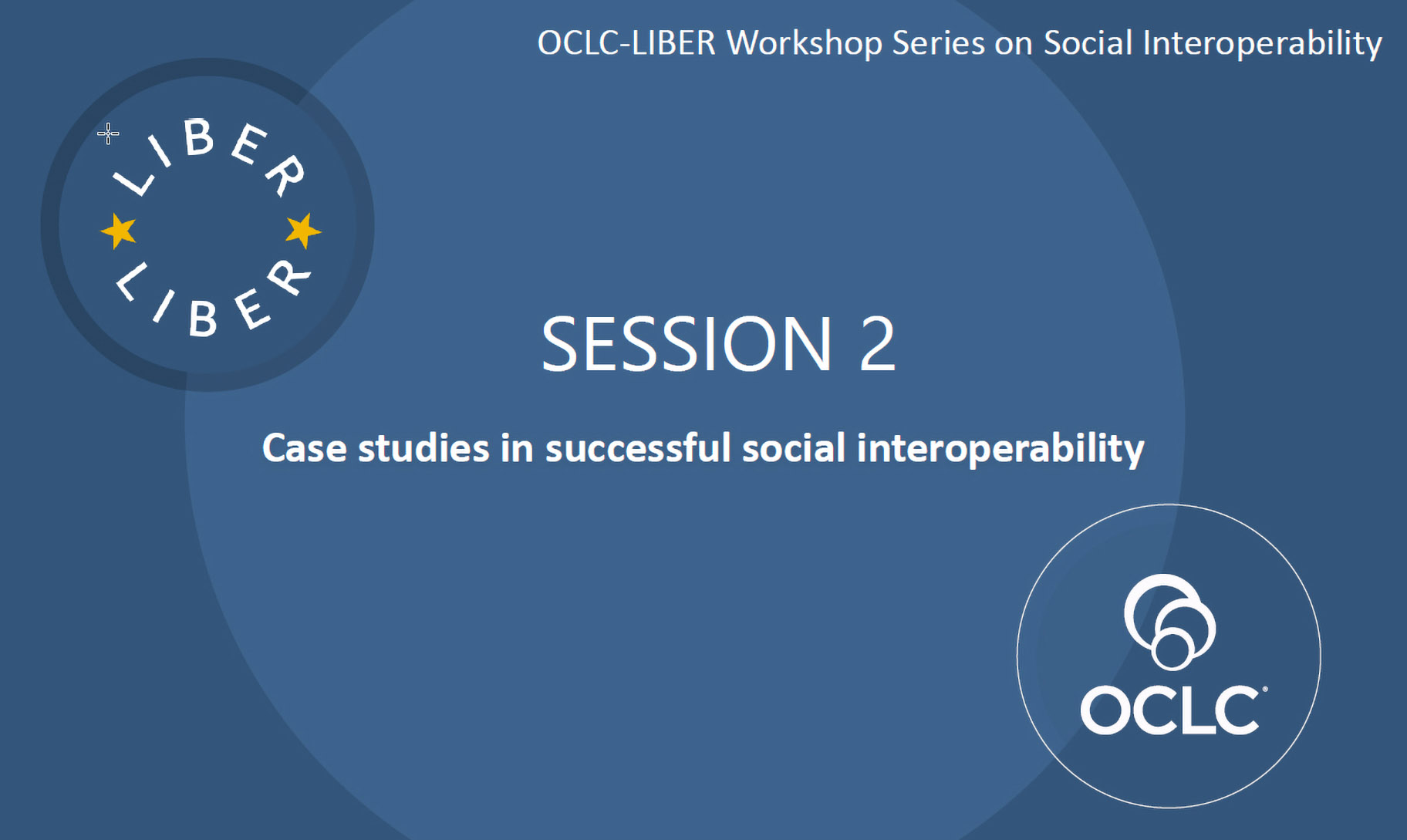
Social Interoperability Workshop 2: Case Studies in Successful Social Interoperability
virtual
Successful advancement of open scholarship initiatives at research universities worldwide is dependent upon collaboration and partnership among many stakeholders from across the institution. The recent OCLC Research Report, Social Interoperability in Research Support: Cross-Campus Partnerships and the University Research Enterprise, emphasizes that the best chance for developing these relationships is to cultivate a deep understanding of potential stakeholders: their responsibilities, pain points, and areas of common interest where engagement can take root and flourish.
However, in the recent OCLC-LIBER Open Science Discussion Series, many librarians reported feeling inadequately equipped to connect with the array of non-library stakeholders essential for open science success, despite the widespread acknowledgement that “open science must be a collective effort.” One participant even stated, “It’s making the connection that is most important…because we don’t know what they need.” A key takeaway from that discussion series was that library practitioners must develop a specific type of soft skill: the ability to create and maintain working relationships between individuals and organizational units that promote collaboration, communication, and mutual understanding. We call this skill “social interoperability.”
In May 2021, OCLC and LIBER are again collaborating to offer a three-session workshop series exclusively for LIBER members and OCLC Research Library Partnership Affiliates, using both the Social Interoperability in Research Support report and the key takeaways from the OCLC-LIBER Open Science Discussion Series, as a core component of the workshop curriculum. This workshop series is a pilot effort and participation numbers are strictly limited. Our organizations will be working together to assess the pilot and explore if this training exercise can be scaled to support more librarians.
WORKSHOP 2
The second workshop examines strategies and tactics that can support successful social interoperability. Participants discuss several case studies that exemplify successful cross-institutional collaboration in support of open scholarship in order to develop a shared understanding of both the ‘what’ and ‘how’ of relationship development/management.
Resources:
- Social Interoperability in Research Support, pages 16-35
- Case studies from different national environments:
- “The Big Ask”: Securing Recurring Campus Funding for a Research Data Service at the University of Illinois
- Emerging Roles for Libraries in Bibliometric and Research Impact Analysis: Lessons Learned from the University of Waterloo
- Zeeland, Hilde Van, and Jacquelijn Ringersma. 2017. “The Development of a Research Data Policy at Wageningen University & Research: Best Practices as a Framework.” LIBER Quarterly 27 (1): 153–70. https://doi.org/10.18352/lq.10215.
Topics: Research Data Management, Research Support, Research Information Management
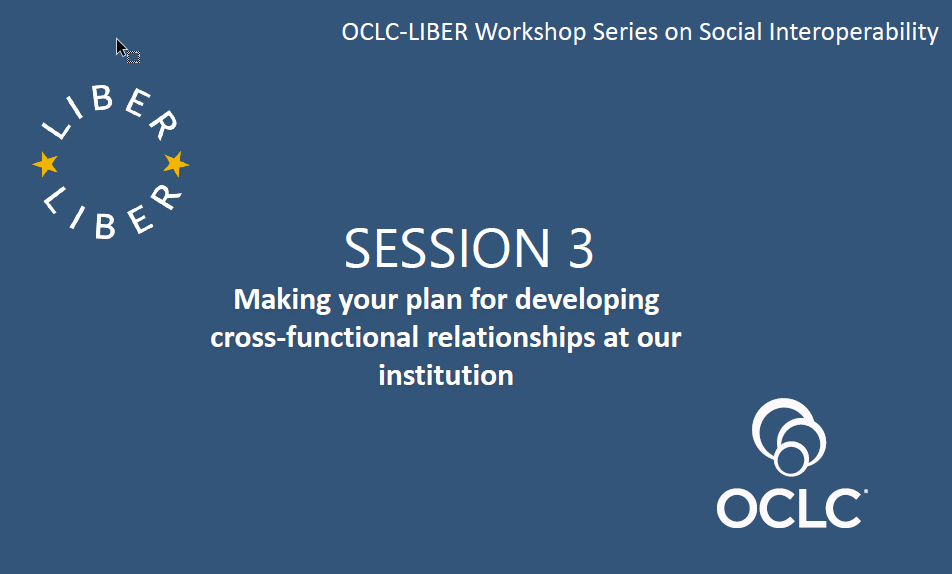
Social Interoperability Workshop 3: Making Your Plan for Developing Cross-Functional Relationships at Our Institution
virtual
Successful advancement of open scholarship initiatives at research universities worldwide is dependent upon collaboration and partnership among many stakeholders from across the institution. The recent OCLC Research Report, Social Interoperability in Research Support: Cross-Campus Partnerships and the University Research Enterprise, emphasizes that the best chance for developing these relationships is to cultivate a deep understanding of potential stakeholders: their responsibilities, pain points, and areas of common interest where engagement can take root and flourish.
However, in the recent OCLC-LIBER Open Science Discussion Series, many librarians reported feeling inadequately equipped to connect with the array of non-library stakeholders essential for open science success, despite the widespread acknowledgement that “open science must be a collective effort.” One participant even stated, “It’s making the connection that is most important…because we don’t know what they need.” A key takeaway from that discussion series was that library practitioners must develop a specific type of soft skill: the ability to create and maintain working relationships between individuals and organizational units that promote collaboration, communication, and mutual understanding. We call this skill “social interoperability.”
In May 2021, OCLC and LIBER are again collaborating to offer a three-session workshop series exclusively for LIBER members and OCLC Research Library Partnership Affiliates, using both the Social Interoperability in Research Support report and the key takeaways from the OCLC-LIBER Open Science Discussion Series, as a core component of the workshop curriculum. This workshop series is a pilot effort and participation numbers are strictly limited. Our organizations will be working together to assess the pilot and explore if this training exercise can be scaled to support more librarians.
WORKSHOP 3
In this final workshop, the trainers offer some additional resources to support participants as they return to their institutions. Participants share about what they’ve learned, describe what tactics they will adapt for relationship building at their institutions, and develop a list of activities they plan to adopt—and share with others at their institution—to develop stronger cross-campus relationships.
Resource:
- Review Social Interoperability in Research Support, pages 26-33, with particular attention to the sidebar “script for learning about other units” on page 27
Topics: Research Data Management, Research Support, Research Information Management
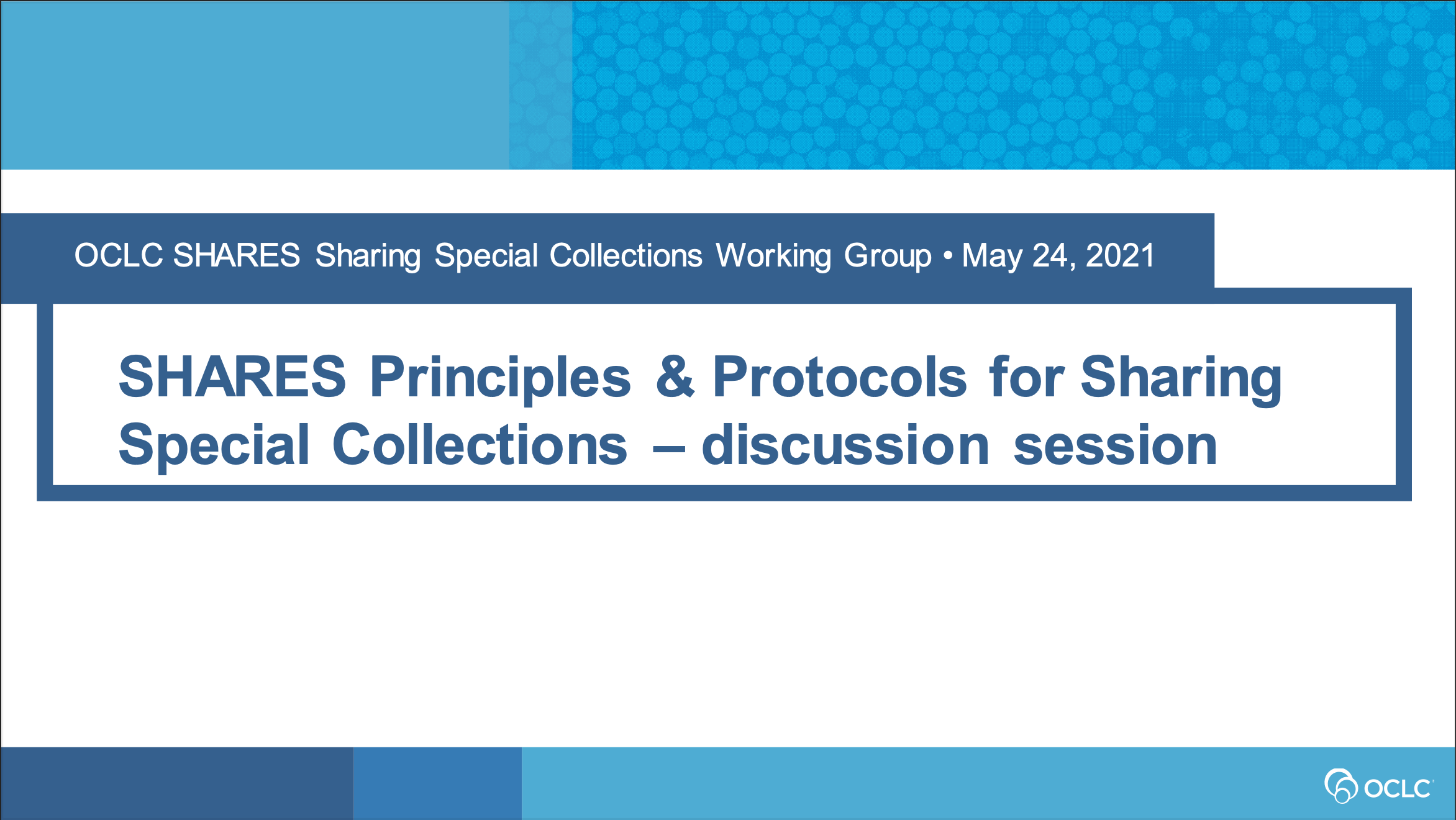
SHARES Sharing Special Collections: draft principles and protocols
These draft Principles and Protocols are meant to reflect the SHARES philosophy of liberal lending policies which promote access, enrich research, and support a collaborative environment between partner libraries. The purpose of the Principles and Protocols is to establish common expectations among SHARES libraries when requesting or supplying special collections materials while also allowing flexibility and customization within local workflows.
Topics: SHARES, Archives and Special Collections

Transitioning to the Next Generation of Metadata
virtual
Titia van der Werf and Ellen Hartman presented on the findings from the RLP Metadata Managers Focus Group discussions (as published in Karen Smith-Yoshimura's Report) and the OCLC Research round table discussions (held in March 2021) on the Next Generation of Metadata.
Topics: Metadata
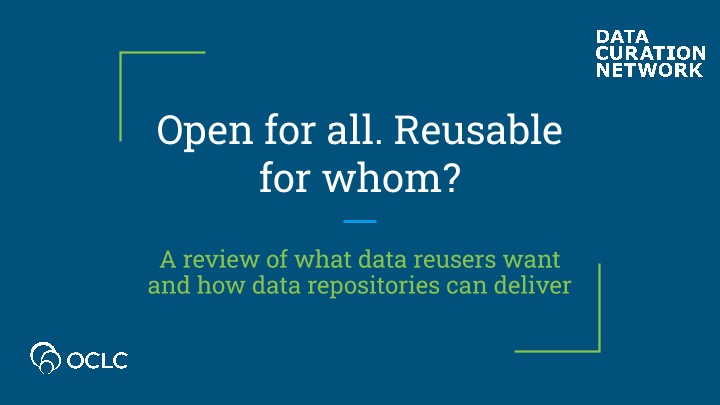
Open for All, Reusable for Whom?: A Review of What Data Reusers Want and How Data Repositories Can Deliver
virtual
Understanding how data reusers seek and evaluate potential data for reuse will aid data curators, data managers, and developers in the open repository field. We will review past studies of data reusers, specifically a qualitative study of 105 researchers from three disciplinary communities: quantitative social science, archaeology, and zoology. The study identified 12 types of context information that data reusers mention needing when deciding whether to reuse data. Next, we will use the context types to create a feature set and assess how data repositories provide the needed context information to users. Finally, using findings from our assessment, we will showcase desirable features in use to prototype the design of a reuser-oriented data repository that developers can use to improve their data repository interface.
Topics: Open Access, Research Data Management

Visions of Transformation for a New Model Library
virtual
The need to adapt during a crisis is often the impetus for change. During this presentation, Ixchel Faniel will share findings from an OCLC Research project that looked into the future with twenty-nine global leaders from public, two-year, four-year, and research libraries. As these leaders reflected on their responses to rapidly changing community and institutional needs during the COVID-19 pandemic, they discussed the changes they want to take into the future. These discussions illuminated new and evolving practices and policies to support the work, collections, and engagement experiences in libraries as they move beyond the pandemic.
Topics: New Model Library, Open Access, Library Consortia, Institutional Organization

OCLC Research Update ALA Annual 2021
virtual
This session previews work in progress and highlights recent findings, tools, and information resources produced by OCLC Research to help library staff and decision makers navigate destabilized ecosystems and influence positive change in libraries and librarianship. The session will include "lightning talks" on (1) the near-term impact of our Access to Civil Legal Justice training program; (2) our upcoming convening with a diverse array of community stakeholders to discuss how to address systemic biases and improve racial equity in descriptive practices, tools, infrastructure and workflows; and (3) our approach to developing a suite of on-demand courses on the digital stewardship lifecycle for small rural public and tribal libraries. These projects all involve activities to understand emerging needs and contexts, convene library stakeholders to synthesize diverse perspectives and ideas, and share information and resources broadly with library leaders, staff, and researchers.
View OCLC Research Citations - ALA Annual 2021 (pdf)

Bringing IIIF Manifests to Life in Wikidata with Mirador 3 - 2021 IIIF Annual Conference
virtual
Wikidata is an open knowledge base of structured data that describes any type of entity, including people, organizations, concepts, events, places, and works. Some works described in Wikidata now include a IIIF Presentation Manifest URL. In Wikidata’s default user interface, that URL appears as a link to the Manifest JSON. But Wikidata can be customized to alter the user interface and add new features.
In this presentation we will discuss and demonstrate a Wikidata user script that, for items that include a IIIF Presentation Manifest URL, will embed the ProjectMirador viewer and load the Manifest JSON so that the images referenced in the Manifest can be viewed in the context of other Wikidata statements about the work.
The discussion will cover how the user script embeds the Mirador3 viewer within a Wikidata item page and how it detects that the viewer should be added. We will also illustrate how one library is including IIIF manifests in Wikidata, with a conversation about learnings from that work, and about how the user script has contributed to the library's understanding of IIIF metadata and Wikidata. The demonstration will show how Wikidata user scripts are created and shared and look at ways in which Wikidata queries can uncover IIIF manifests.
Topics: Wikimedia, IIIF

Case Studies of US Research Information Management
virtual
This session shares findings from a forthcoming OCLC Research report on Research Information Management Practices in the United States (http://oc.lc/us-rim-project), scheduled for early fall 2021. The report collects evidence from in-depth case studies of RIM practices at five US research universities: Penn State University, Texas A&M University, Virginia Tech, UCLA, and University of Miami. The case studies represent open source, proprietary, and home grown RIM solutions at the five institutions and highlight the proliferation of use cases such as public portals, faculty activity reporting, and strategic reporting.
By synthesizing information from the five case studies, we offer a comprehensive definition of Research Information Management and also document the multiple use cases that proliferate in decentralized US research universities. We will also offer a new RIM System Framework, which describes the required and optional functional and technical elements that comprise the architecture of US RIM systems, regardless of use case. We believe that this framework will help demystify RIM infrastructure and also help practitioners better understand the array of campus stakeholders required for successful RIM implementation.
This research is based upon interviews with 39 participants engaged in RIM activities at the five case study institutions and builds upon the significant body of work on RIM practices already produced by OCLC Research (oc.lc/rim). We believe this research is of considerable utility to the university community, offering a more comprehensive and strategic view of RIM practices, along with recommendations for institutions. We will conclude the presentation by demonstrating the value of the case studies and framework through examples pulled from the report’s case studies.
Topics: Research Information Management
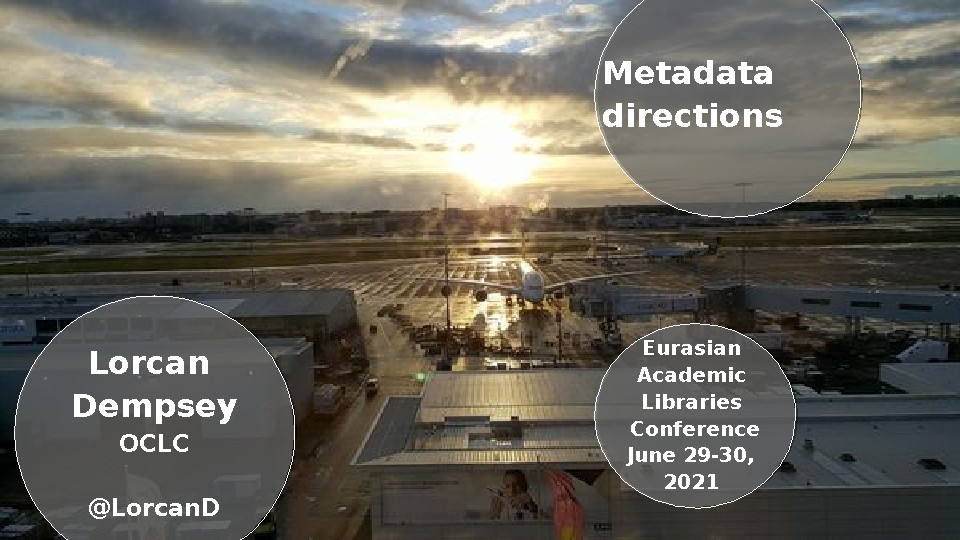
Metadata directions
virtual
Metadata assume growing importance as our environments become more digital and automated. Metadata is the intelligence in the system which allows us to work with resources without having advanced knowledge of their existence or characteristics. This presentation will briefly explore how our metadata apparatus is evolving to better support activity in this environment. It will talk about a move towards linked data and entification, about how we need to pluralize our vocabularies to better represent diverse experiences and memories, and about how the uses to which we put metadata are multiplying. We have used metadata to organize resources and for discovery. We now want to make data work harder in a variety of ways.
More information about the conference is available at the Conference website. Full recordings of this conference's presentations are available on the Nazarbayev University Library YouTube channel.
Topics: Metadata

Total Cost of Stewardship: Responsible Collection Building in Archives & Special Collections
virtual
Developed by the OCLC Research Library Partnership’s (RLP) Collection Building and Operational Impacts Working Group, Total Cost of Stewardship is a framework that proposes a holistic approach to understanding the resources needed to responsibly acquire and steward archives and special collections. The Total Cost of Stewardship Framework responds to the ongoing challenge of descriptive backlogs in archives and special collections by connecting collection development decisions with stewardship responsibilities.
Topics: Research Library Partnership

Bringing IIIF Manifests to life in Wikidata
virtual
Wikidata is an open knowledge base of structured data that describes any type of entity, including people, organizations, concepts, events, places, and works. Some works described in Wikidata now include a IIIF Presentation Manifest URL. In Wikidata’s default user interface, that URL appears as a link to the Manifest JSON. But Wikidata can be customized to alter the user interface and add new features. We will discuss and demonstrate a Wikidata user script that, for items that include a IIIF Presentation Manifest URL, will embed the ProjectMirador viewer and load the Manifest JSON so that the images referenced in the Manifest can be viewed in the context of other Wikidata statements about the work. The discussion will cover how the script embeds the Mirador3 viewer within a Wikidata item page and how it detects that the viewer should be added. We will also illustrate how one library is including IIIF manifests in Wikidata and about how the user script has contributed to the library's understanding of IIIF metadata and Wikidata. The demonstration will show how Wikidata user scripts are created and shared and look at ways in which Wikidata queries can uncover IIIF manifests.
Topics: IIIF, Wikimedia
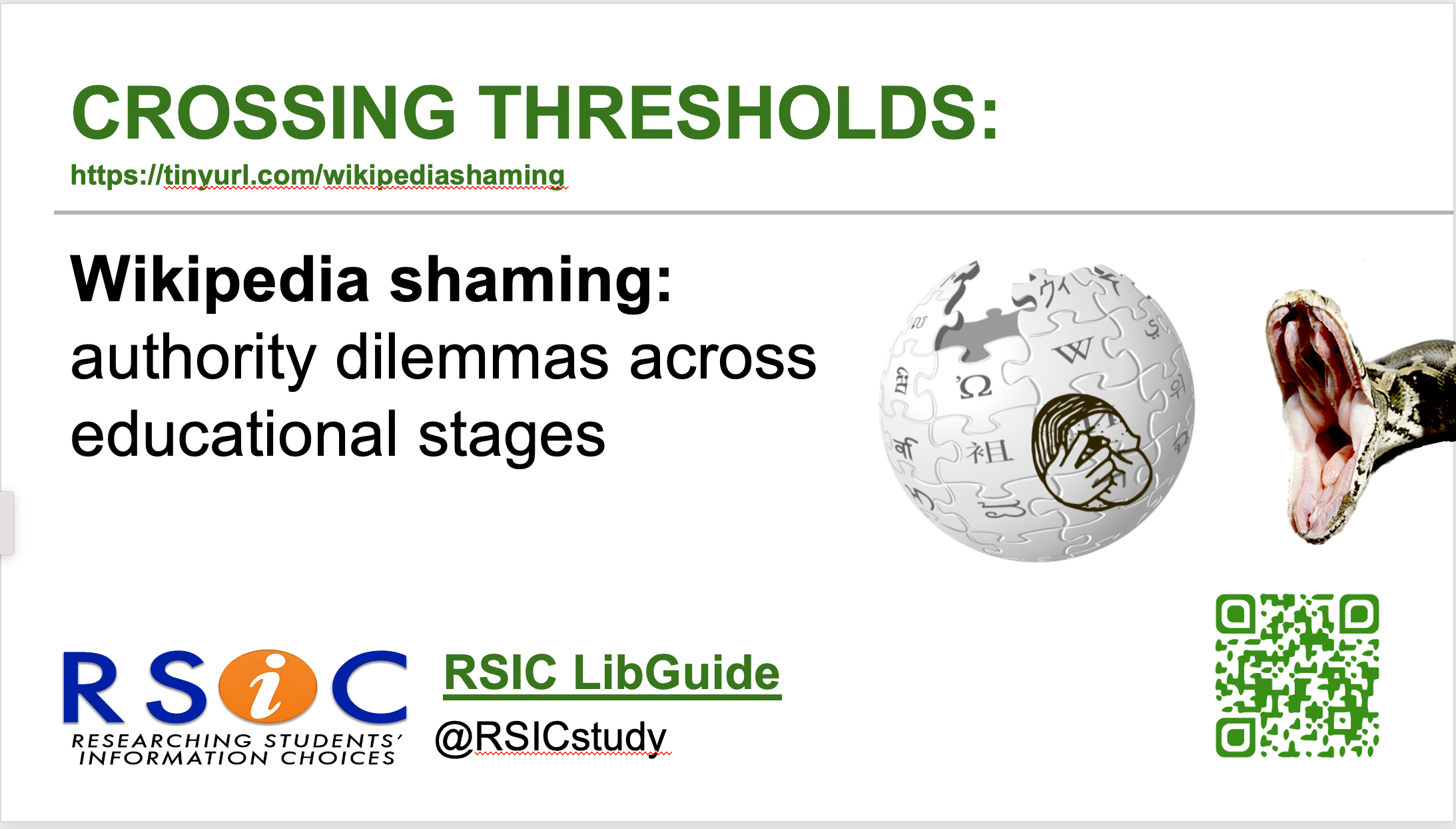
Wikipedia Shaming: Authority dilemmas across educational stages
Virtual
As Wikipedia reaches maturity, celebrating its 21st birthday this coming year, isn't it time to consider its adulthood? Results from our research of 175 students, which used a simulated set of Google search results to see how students select and judge resources for a research project, suggest we should. Since its birth, students have been generally discouraged from using Wikipedia, but as this collaborative reference tool has evolved, so should our consideration of its value.
Topics: Wikimedia, Equity, Diversity, Inclusion

The Future of Library Collaboration
virtual
The network reshapes the library,” and one of the most common ways for libraries to enjoy network effects is by participating in cooperative organizations. OCLC, LYRASIS, and the plethora of regional membership collaboratives have historically offered many benefits in both collection development and library systems management: shared cataloging, database licensing, streaming resources, cloud-sourced discovery systems, library management platforms, collaborative research, and continuing education. However, COVID-19 and the global economic effects of community health measures have already impacted library budgets, staffing, and capabilities, and have forced many libraries and cultural heritage institutions to “pivot” and re-consider their basic mission and operations. The pandemic might challenge the field, but it also can provide opportunities for re-imagining collective ideals of library service, and the same cooperatives can help libraries re-envision and transition into a new normal. Join representatives from three regional library membership cooperatives and OCLC, to hear a vibrant discussion about the future of library collaboration in the age of COVID, hosted by the Association for Information Science & Technology and the Midwest Regional Chapter of ASIS&T.
Topics: New Model Library

On the Way to Library Linked Data
virtual
For more than a decade, OCLC’s Research division has been investigating the tools, standards, workflows, and strategies for making the transition from traditional bibliographic metadata to fully linked data. In this presentation, OCLC Research Software Engineers, Jeff Mixter and Bruce Washburn, will provide a perspective on the promise and potential of library linked data that is framed by OCLC Research’s past work.
In a recently completed pilot project, OCLC partnered with five institutions that manage their digital collections with OCLC’s CONTENTdm service to investigate methods for—and the feasibility of—transforming metadata into linked data to improve the discoverability and management of digitized cultural materials and their descriptions. This pilot project, reported in “Transforming Metadata into Linked Data to Improve Digital Collection Discovery”, was designed to help the OCLC team and the pilot participants better understand the following questions:
How divergent are the descriptive data practices across the institutions using CONTENTdm, and what tools are needed to make that assessment?
Can a shared and extensible data model be developed to support the differing needs and demands for a range of material types and institution types?
What is the right mix of human attention and automation to effectively reconcile metadata headings to linked data entities?
What types of tools can help extend the description of cultural materials to subject matter experts?
After metadata from different institutions and collections is transformed, are there new discovery tools that can help researchers find new—or previously hidden—connections through a centralized discovery system?
What are the institutional and individual interests in the paradigm shift of moving to linked data?
A discussion of the findings and lessons learned from investigating these questions will be the primary focus of the presentation, and we will wrap up with a look into the near future for OCLC linked data developments.
Topics: Linked Data

EBLIDA & OCLC Workshop
virtual
The impact of the pandemic has been felt by many within the library sector with changes to both workflows and library offerings. Some of these changes are here to stay and we will continue to feel their impact going forward in the form of positive, long-term change.
As a part of OCLC Research’s work in documenting how libraries as organizations operate, adapt, and evolve, the OCLC Research team met with global library leaders to discuss emerging library models in response to the changes caused by the COVID-19 pandemic. They looked at new and evolving practices and policies, possibilities for collaboration, and how these opportunities can benefit their communities into the future.
During this session, representatives from OCLC Research will share their findings and conclusions based on the library leaders’ vision as their New Model Library emerges. A corresponding report will be made available later this year.
Topics: New Model Library

Wikipedia and Libraries
virtual
Originally presented in 2020 at the Convegno Stelline (Bibliostar) 2020, this session “Wikipedia and Libraries: Partnerships to reach the future” highlights how OCLC has invested in partnerships with Wikimedia projects, and shares success stories from different types of institutions that all share a goal of connecting communities of knowledge.
The accompanying conference paper “Wikimedia and Libraries: From Vision to Practice” makes an argument that libraries and Wikimedia make great partnerships that can collaborate to strengthen shared information access goals. The paper also shares illustrative examples from OCLC’s direct experience on efforts that partner librarians and Wikimedians working in common purpose.
Topics: Wikimedia

Collection Directions: Pandemic Effects
Ostend, Belgium
Lorcan Dempsey presents on the effects of the pandemic on collection directions, including the accelerating demand to move more library services online, at Informatie aan Zee 2021.

Envisioning a New Model Library
Library leaders had to make quick, robust changes to their library workflows, community offerings, and staffing in reaction to the COVID-19 pandemic.
Join us for a 60-minute webinar to hear from:
Dr. Ixchel Faniel, Senior Research Scientist, who will present library models emerging as a result of these changes. The models are based on an OCLC Research study with 29 global library leaders, who discussed their visions for libraries as a result of changing practices and environments.
Emma Hill Kepron, Associate Dean of the University Library at the University of Winnipeg, who will discuss how library practices and use of OCLC WorldShare Management Services has evolved during the pandemic and how their adaptations fit into new models of library operation.
Topics: New Model Library

Advancing Institutional Priorities through Research Information Management (RIM) Infrastructures
virtual
This session will share the findings from a forthcoming OCLC Research report on information management practices in the United States (http://oc.lc/us-rim-project), scheduled for early fall 2021. The report collects evidence from in-depth case studies of RIM practices at five US research universities, highlighting the proliferation of use cases such as faculty activity reporting, public portals, and strategic reporting. RIM practices represent a type of digital transformation (Dx) that can advance research, provide evidence for strategic decision support, and streamline administrative workflows. The presentation will also share the RIM System Framework featured in the report, which describes the required and optional functional and technical elements that comprise the architecture of US RIM systems. We believe that this framework will help demystify RIM infrastructure and help practitioners better understand the array of campus stakeholders required for successful RIM implementation. We will conclude the presentation by demonstrating the value of the case studies and framework through examples pulled from the report’s case studies.
Topics: Research Information Management

Obstacles and Opportunities in Research Information Management in the United States
virtual
Research information management (RIM) is a rapidly growing area of investment in US research universities, and the OCLC Research report series Research Information Management in the United States (published in October 2021) offers a comprehensive and strategic view of the uses, stakeholders, and infrastructures prevalent in the decentralized US landscape. In this presentation, the lead authors of the reports will share key findings of the project, which documents in detail the RIM practices at five US research universities. The presentation will describe six RIM use cases (such as public portals, faculty activity reporting, and strategic reporting) identified in the study, and it will also describe a new RIM System Framework model to facilitate understanding of the functional and technical elements of a RIM system. The presentation will conclude with recommendations for institutional decision makers.
Topics: Research Information Management